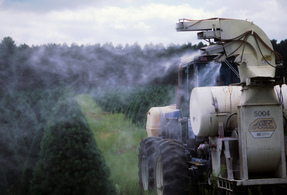 MedPage Today reported on two recent studies linking indoor home insecticide use or outdoor herbicide use to a significant increase in risk for childhood cancers like leukemia and lymphomas. Daniel S. Wechsler, MD, PhD, associate professor, pediatrics and pharmacology & cancer biology at Duke University Medical Center, noted, "The current study adds to the 'smoking gun' raised by other investigators that pesticides could contribute to the development of cancer in children...It certainly seems prudent to limit exposure of children (or anyone) to these agents, especially in indoor locations." Harvard researcher Chesheng Lu, PhD, MS, noted, "Pediatricians should remind parents with young kids to try not to use pesticides in your household and if kids go to a daycare or school that uses lots of pesticides, parents may need to talk to the school or school district to see if there's a better alternative without using chemical-based treatment." Before you start spraying your house for pests or bombarding your dandelions with herbicide, think about your children or your neighbors' children that will be exposed to the poisonous chemicals. Consider creating a healthier chemical-free yard with permaculture gardening to control your pests for you and provide a healthy place for children to play.
0 Comments
Permaculture is a system of gardening (and living) that tries to mimic nature by learning from it and applying those lessons. It seeks to minimize waste and the use of external resources (water, chemicals, fuel, etc.) in the most efficient way possible to create a natural abundance. What's all that really mean? Check out these tips for a better idea...
5 Permaculture Tips For Better Gardening
 Is pesticide exposure harming your family? Experts (including doctors) have long told Americans not to worry about being harmed by the chemical cocktails of pesticides, herbicides, and insecticides used to grow our produce bigger, faster, and blemish-free. However, research has now shown that Americans, including newborns, have surprising levels of pesticides accumulating in their bodies. Now that research has linked these chemical to health problems, scientists and medical organizations are finally starting to sound the alarm. American Academy of Pediatrics Recommends Reducing Pesticide Exposure The American Academy of Pediatrics released a new policy statement describing the harmful effects of pesticides and how to reduce exposure. Here are highlights of the AAP statement on pesticides:  There are plenty of excuses for not eating healthy. The most common complaint is that it costs too much. Most won't argue that they could actually save money in the long run by avoiding expenses for health problems related to unhealthy eating. But what about right now? Here's 7 tips to help you spend less now (and later) while eating healthier.
You don't have to be rich to eat healthy. It just takes a little effort, but it's worth it. |
Details
THE NATURALS
AuthorsDr Aaron McMichael + Dr Ryan McMichael Categories
All
Archives
June 2025
_Information and statements made are for education purposes and are not intended to replace the advice of your treating doctor. This blog is not a doctor and will not diagnose or treat your problems.
|
 RSS Feed
RSS Feed